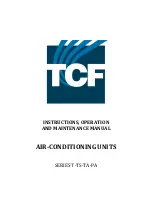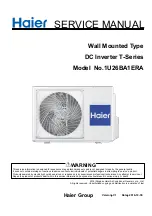
7
|
Installation
Installer reference guide
82
EPGA11~ EAV23DA6V
Daikin Altherma 3 H F
4P606487-1 – 2019.12
▪
Drain prevention. Only applicable when
Bivalent
is enabled ([C‑02]=1). This
function prevents the opening of freeze protection valves in the water piping to
the outdoor unit when the auxiliary boiler is running at negative outdoor
temperatures.
However, in case of a power failure, these functions cannot guarantee protection.
Do one of the following to protect the water circuit against freezing:
▪
Add glycol to the water. Glycol lowers the freezing point of the water.
▪
Install freeze protection valves. Freeze protection valves drain the water from
the system before it can freeze.
NOTICE
If you add glycol to the water, do NOT install freeze protection valves.
Possible
consequence:
Glycol leaking out of the freeze protection valves.
Freeze protection by glycol
About freeze protection by glycol
Adding glycol to the water lowers the freezing point of water.
WARNING
Ethylene glycol is toxic.
WARNING
Due to the presence of glycol, corrosion of the system is possible. Uninhibited glycol
will turn acidic under the influence of oxygen. This process is accelerated by the
presence of copper and high temperatures. The acidic uninhibited glycol attacks
metal surfaces and forms galvanic corrosion cells that cause severe damage to the
system. Therefore it is important that:
▪
the water treatment is correctly executed by a qualified water specialist,
▪
a glycol with corrosion inhibitors is selected to counteract acids formed by the
oxidation of glycols,
▪
no automotive glycol is used because their corrosion inhibitors have a limited
lifetime and contain silicates which can foul or plug the system,
▪
galvanized pipes are NOT used in glycol systems since the presence may lead to
the precipitation of certain components in the glycol's corrosion inhibitor.
NOTICE
Glycol absorbs water from its environment. Therefore do NOT add glycol that has
been exposed to air. Leaving the cap off the glycol container causes the
concentration of water to increase. The glycol concentration is then lower than
assumed. As a result, the hydraulic components might freeze up after all. Take
preventive actions to ensure a minimal exposure of the glycol to air.
Types of glycol
The types of glycol that can be used depend on whether the system contains a
domestic hot water tank:
If…
Then…
The system contains a domestic hot
water tank
Only use propylene glycol
(a)
The system does NOT contain a
domestic hot water tank
You can use either propylene glycol
(a)
or
ethylene glycol
















































